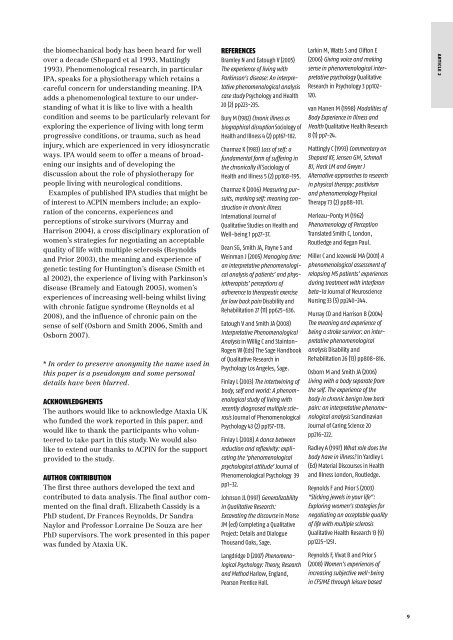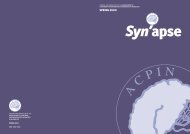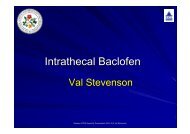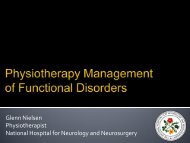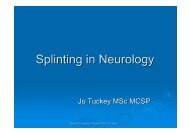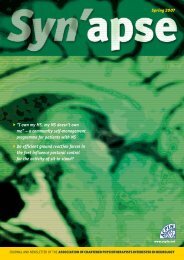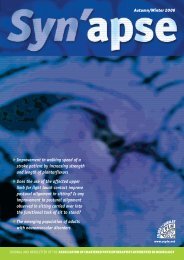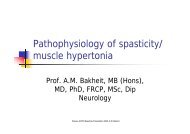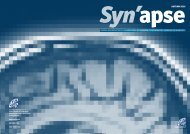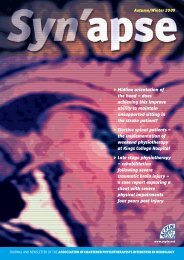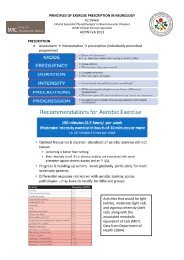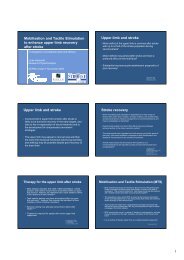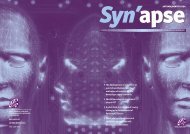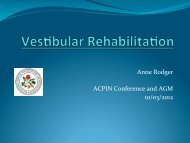SYNAPSE Spring 2009 - acpin
SYNAPSE Spring 2009 - acpin
SYNAPSE Spring 2009 - acpin
You also want an ePaper? Increase the reach of your titles
YUMPU automatically turns print PDFs into web optimized ePapers that Google loves.
the biomechanical body has been heard for well<br />
over a decade (Shepard et al 1993, Mattingly<br />
1993). Phenomenological research, in particular<br />
IPA, speaks for a physiotherapy which retains a<br />
careful concern for understanding meaning. IPA<br />
adds a phenomenological texture to our understanding<br />
of what it is like to live with a health<br />
condition and seems to be particularly relevant for<br />
exploring the experience of living with long term<br />
progressive conditions, or trauma, such as head<br />
injury, which are experienced in very idiosyncratic<br />
ways. IPA would seem to offer a means of broadening<br />
our insights and of developing the<br />
discussion about the role of physiotherapy for<br />
people living with neurological conditions.<br />
Examples of published IPA studies that might be<br />
of interest to ACPIN members include; an exploration<br />
of the concerns, experiences and<br />
perceptions of stroke survivors (Murray and<br />
Harrison 2004), a cross disciplinary exploration of<br />
women’s strategies for negotiating an acceptable<br />
quality of life with multiple sclerosis (Reynolds<br />
and Prior 2003), the meaning and experience of<br />
genetic testing for Huntington’s disease (Smith et<br />
al 2002), the experience of living with Parkinson’s<br />
disease (Bramely and Eatough 2005), women’s<br />
experiences of increasing well-being whilst living<br />
with chronic fatigue syndrome (Reynolds et al<br />
2008), and the influence of chronic pain on the<br />
sense of self (Osborn and Smith 2006, Smith and<br />
Osborn 2007).<br />
* In order to preserve anonymity the name used in<br />
this paper is a pseudonym and some personal<br />
details have been blurred.<br />
ACKNOWLEDGMENTS<br />
The authors would like to acknowledge Ataxia UK<br />
who funded the work reported in this paper, and<br />
would like to thank the participants who volunteered<br />
to take part in this study. We would also<br />
like to extend our thanks to ACPIN for the support<br />
provided to the study.<br />
AUTHOR CONTRIBUTION<br />
The first three authors developed the text and<br />
contributed to data analysis. The final author commented<br />
on the final draft. Elizabeth Cassidy is a<br />
PhD student, Dr Frances Reynolds, Dr Sandra<br />
Naylor and Professor Lorraine De Souza are her<br />
PhD supervisors. The work presented in this paper<br />
was funded by Ataxia UK.<br />
REFERENCES<br />
Bramley N and Eatough V (2005)<br />
The experience of living with<br />
Parkinson’s disease: An interpretative<br />
phenomenological analysis<br />
case study Psychology and Health<br />
20 (2) pp223-235.<br />
Bury M (1982) Chronic illness as<br />
biographical disruption Sociology of<br />
Health and Illness 4 (2) pp167-182.<br />
Charmaz K (1983) Loss of self: a<br />
fundamental form of suffering in<br />
the chronically ill Sociology of<br />
Health and Illness 5 (2) pp168-195.<br />
Charmaz K (2006) Measuring pursuits,<br />
marking self: meaning construction<br />
in chronic illness<br />
International Journal of<br />
Qualitative Studies on Health and<br />
Well-being 1 pp27-37.<br />
Dean SG, Smith JA, Payne S and<br />
Weinman J (2005) Managing time:<br />
an interpretative phenomenological<br />
analysis of patients’ and physiotherapists’<br />
perceptions of<br />
adherence to therapeutic exercise<br />
for low back pain Disability and<br />
Rehabilitation 27 (11) pp625-636.<br />
Eatough V and Smith JA (2008)<br />
Interpretative Phenomenological<br />
Analysis in Willig C and Stainton-<br />
Rogers W (Eds) The Sage Handbook<br />
of Qualitative Research in<br />
Psychology Los Angeles, Sage.<br />
Finlay L (2003) The intertwining of<br />
body, self and world: A phenomenological<br />
study of living with<br />
recently diagnosed multiple sclerosis<br />
Journal of Phenomenological<br />
Psychology 43 (2) pp157-178.<br />
Finlay L (2008) A dance between<br />
reduction and reflexivity: explicating<br />
the ‘phenomenological<br />
psychological attitude’ Journal of<br />
Phenomenological Psychology 39<br />
pp1-32.<br />
Johnson JL (1997) Generalizability<br />
in Qualitative Research:<br />
Excavating the discourse in Morse<br />
JM (ed) Completing a Qualitative<br />
Project: Details and Dialogue<br />
Thousand Oaks, Sage.<br />
Langdridge D (2007) Phenomenological<br />
Psychology: Theory, Research<br />
and Method Harlow, England,<br />
Pearson Prentice Hall.<br />
Larkin M, Watts S and Clifton E<br />
(2006) Giving voice and making<br />
sense in phenomenological interpretative<br />
psychology Qualitative<br />
Research in Psychology 3 pp102-<br />
120.<br />
van Manen M (1998) Modalities of<br />
Body Experience in Illness and<br />
Health Qualitative Health Research<br />
8 (1) pp7-24.<br />
Mattingly C (1993) Commentary on<br />
Shepard KF, Jensen GM, Schmoll<br />
BJ, Hack LM and Gwyer J<br />
Alternative approaches to research<br />
in physical therapy: positivism<br />
and phenomenology Physical<br />
Therapy 73 (2) pp88-101.<br />
Merleau-Ponty M (1962)<br />
Phenomenology of Perception<br />
Translated Smith C, London,<br />
Routledge and Kegan Paul.<br />
Miller C and Jezewski MA (2001) A<br />
phenomenological assessment of<br />
relapsing MS patients’ experiences<br />
during treatment with interferon<br />
beta-1a Journal of Neuroscience<br />
Nursing 33 (5) pp240-244.<br />
Murray CD and Harrison B (2004)<br />
The meaning and experience of<br />
being a stroke survivor: an interpretative<br />
phenomenological<br />
analysis Disability and<br />
Rehabilitation 26 (13) pp808-816.<br />
Osborn M and Smith JA (2006)<br />
Living with a body separate from<br />
the self. The experience of the<br />
body in chronic benign low back<br />
pain: an interpretative phenomenological<br />
analysis Scandinavian<br />
Journal of Caring Science 20<br />
pp216-222.<br />
Radley A (1997) What role does the<br />
body have in illness? In Yardley L<br />
(Ed) Material Discourses in Health<br />
and Illness London, Routledge.<br />
Reynolds F and Prior S (2003)<br />
“Sticking jewels in your life”:<br />
Exploring women’s strategies for<br />
negotiating an acceptable quality<br />
of life with multiple sclerosis<br />
Qualitative Health Research 13 (9)<br />
pp1225-1251.<br />
Reynolds F, Vivat B and Prior S<br />
(2008) Women’s experiences of<br />
increasing subjective well-being<br />
in CFS/ME through leisure based<br />
ARTICLE 2<br />
9


